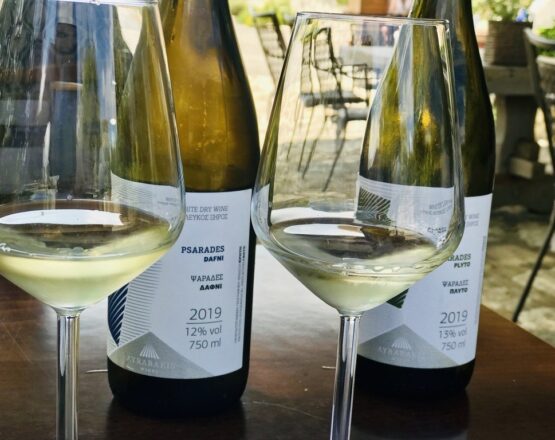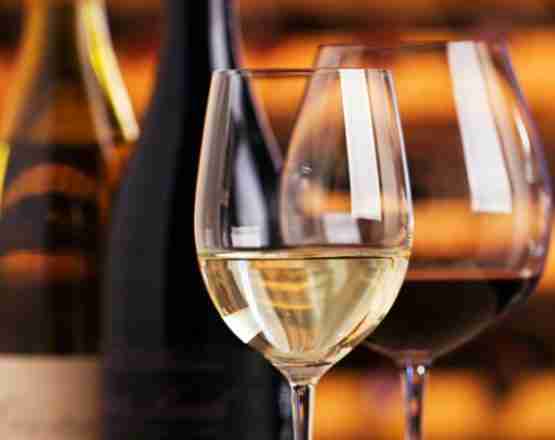LYRARAKIS Wines
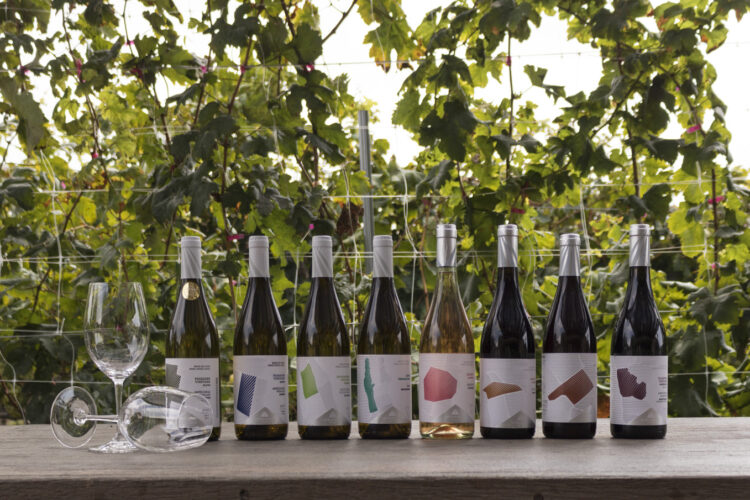
”There is a land in the middle of the dark wine sea. Crete,(Odyssey)
The Lyrarakis estate has a jewel: an old stone carved wine press that can still be visited today, where one can meet Dionysus and Pramneion Wine! The strong red dry wine which, according to tradition and legend, was drunk by the maenads to come into ecstasy and by warriors before battle.
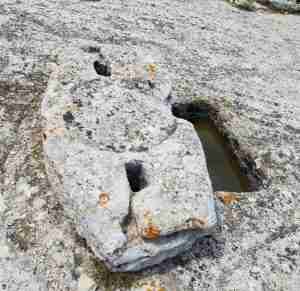
Dionysus the Cretan, will initially be introduced to us as Zan or even Zeus here in Crete, while later he will adopt the epithet Zagreus. We first meet him as the god of the vegetation of the Aegean and Dionysus’ protectors while he was young, here in Crete,the wild animals, the Curetes and the god Apollo protected him!
Apollo and Dionysus are interconnected deities like the Sun and Moon couple. During the winter, the Oracle of Delphi was under the protection of Dionysus. This minor god was the guarantee that life would win again, only for the god of light Apollo to come next and signal the beginning of spring and the resurrection of nature.
Hence the abstinence from meat and Carnival.
The relationship that the Cretans have with the Ancient gods goes back to prehistoric times and is mentioned by Homer, when he tells us in the Iliad about the Pyra of Patroclus, which the Cretans and Idomenes undertook to carry out!
The fact that he is born at night, like all the moon gods, makes Dionysus a great hunter. Raised in nature, he becomes able to deal with natural phenomena and beasts during his wanderings in the East and Egypt. This wandering is his passage into adulthood and his realization of himself and his power.
Survival in nature either as Zeus, Dionysus or as a wild and dynamic animal bears witness to a primordial cultural DNA – the Gene, while the sporting events in which he often engages in order to survive conceal deeper religious, political and tribal meanings that we later find in the Olympic Games. An institution inspired by Hercules when he came to Crete to fulfil his 7th labour by capturing the Sacred Bull of the Sea and father of the Minotaur.
The Cretans were known for their sporting events and initiation ceremonies.
Rituals and mystical mysteries of coming of age can be found as far back as Doric Crete, such as those of the Curetes and ancient Sparta respectively.
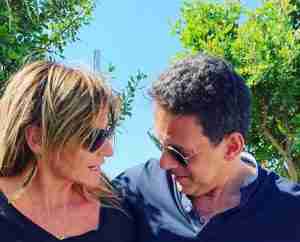
In order for man to escape from the boundaries of the herd and to live together efficiently in larger numbers, he needs to escape the barriers of kinship and develop strong ties between the members of a society.
The sports and skills of youth are initiation passages that essentially go beyond hunting skills to build what we now call a city, culture, nation and identity.
The Cretans and later the ancient Greeks have heroes, athletes and champions who help man to face danger or even evil, just as the Israelites and Christians have their prophets and saints.
The Sacred Bull that Hercules catches is the reason or the occasion if you like to highlight another very important characteristic of Dionysus, his love for woman, since this bull according to the myth is the father of the Minotaur.
Dionysus, as another saviour, will marry Ariadne, after she has managed to escape the darkness of the labyrinth. Ariadne was luckier than Mary Magdalene, respectively, in this encounter with the God.
-Ariadne is not just the daughter of Minos and sister of Minotaur, she is the priestess who can come in and lead you safely away from the darkness of the labyrinth, out into the light again, the immaculate, the Aria-saint. Rightly Dionysus raises her to heaven where she illuminates the Nights of the North.
Dionysus will not live on Olympus with the rest of the Olympian Gods. He travels the world with his donkey teaching the art of Viticulture and the art of Theatre. He offers the world the joy of life and through his arts he becomes a communicator of civilization (civilizer according to others) as well as a helper of democracy, since the theatre either as a space, as a spectacle, or as an art is the ultimate expression of democracy.
We will not meet Dionysus in the Trojan War, where we meet almost half of the Olympian gods, except in the Odyssey. And how could we meet him in a war narrative anyway? Dionysus is a god of peace!
But how does a hunter god of the Moon become a god of wine, tragedy and theatre?
The young Dionysus born from the thigh of Dias was the youngest god in modern Cretan Greek Mythology.
The Titans wearing clay masks hunted him according to Hera’s orders in order to destroy him.
Trying to escape from them, the young Dionysus changes form from a child to a young man, then to a panther, a goat, a tiger, a serpent and finally to a bull.
In this bull form, the Titans catch him, dismember him, cook him and eat him.
The goddess Athena, firstborn daughter of Zeus and sister of Dionysus, manages to save her little brother’s soul by putting it on a compass and returns to Olympus. There Zeus resurrects Dionysus and then slays the Titans by sending them to Tartarus!
As if that wasn’t enough, from the ashes of the Titans he creates us humans.
So we ….already have within us nuggets of this wonderful god having somehow communed with his body, but too often our Titanic nature does not allow us to live as we should.
Dionysus is the spirit of this world, the inner mind of this world.
As the Archetype of life, he is the one who will help us reach the highest cognition, the ability to be able to create by understanding ourselves and our place in this world.
The will to live leads us to the tragic realization between the beauty and truth of artful tithing, and the discharge from the horror of absurdity, ending in the clear awareness of the nothingness of our own existence without crushing us.
Dionysus revealed to us in all its horrible splendour the absurdity of existence, the darkness of our instincts, and the incomprehensibility of the world, and through the vineyard he spoke to us and taught us.
Wine, like us, is composed mainly of water, (70% people and 85% wine). During our development, we are affected by the environment and general conditions, just like wine. Often vine growers are parents and have their vineyards as if they were their children. Wine also goes through a certain gestation period, like a baby, during which its characteristics are formed.
And after its birth comes bottling.
The bottle is the body that, once opened, wants its time to breathe as we do.
It has sound, aroma, colour, taste and although it has a body and personality, once we taste it we have interfered with its characteristics, it is a two-way interaction.
Viticulture, wine, oil and wheat are the basic ingredients for the beginning of civilization and civilized life. In this vineyard I smelled – I heard … as you say here in Crete. Because the Cretans hear the smells: the oregano, the laurel, the beeswax, the arisari, the July sun. Here I have met Dionysus, smiling in a corner, because even if we cannot see him, he is always in front of us and in us.

